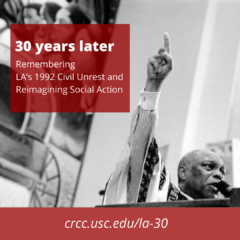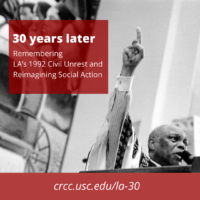Rev. Dr. Cecil L. “Chip” Murray was already a major force in Los Angeles when the 1992 civil unrest helped raise him to greater prominence. As pastor of First African Methodist Episcopal Church (FAME) and later chair of a program that bears his name at the University of Southern California, Murray catalyzed faith groups to respond to social injustices in Los Angeles.
Watch Rev. Murray’s story:
In 1992, Rev. Murray was 15 years into his 27-year tenure as pastor of the historic First African Methodist Episcopal Church (FAME) in Los Angeles. His distinctive theology of deep personal spirituality combined with socially engaged Christianity, along with his method for church leadership and dynamic preaching, helped him transform a small congregation of 250 members into an 18,000-person megachurch.
Prior to the civil unrest, he and a group of pastors were in conversation with city leaders about the ramifications of a not-guilty verdict. Murray’s influence in the community is why Mayor Tom Bradley came to FAME to share his outrage. The civil unrest amplified his voice from the pulpit and within halls of power. Many politicians, including President George W. Bush and President Bill Clinton, visited Rev. Murray’s pulpit and spoke to the congregation.
Following the unrest, FAME’s multi-million dollar community and economic development programs brought jobs, housing and corporate investment into many South Los Angeles neighborhoods.
At USC, meanwhile, religion professor Donald Miller had seen Rev. Murray on television during the civil unrest and wanted to learn more about the faith communities’ role in rebuilding South LA. He first met with Rev. Murray as part of the Religion and Civic Order project, leading to a decades-long collaboration between the two. Murray and Miller describe the beginning of that collaboration, which resulted in the establishment of the USC Center for Religion and Civic Culture, in this video:
After his retirement from formal ministry in 2004, USC recruited Rev. Murray to become a senior fellow of USC’s Center for Religion and Civic Culture (and eventually chairman of the USC Cecil Murray Center for Community Engagement) as well as the Tansey Chair of Christian Ethics in the School of Religion. In his work at CRCC and the Murray Center, Rev. Murray oversees a training curriculum that has prepared hundreds of ministers and laypeople to make vital contributions to improve their communities.
Rev. Murray remains a vibrant force with a passion to ensure that the legacy of African American church leaders of the Civil Rights era is transmitted to the next generation of community leaders.

